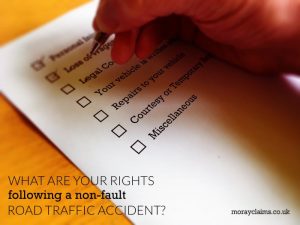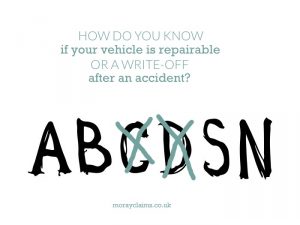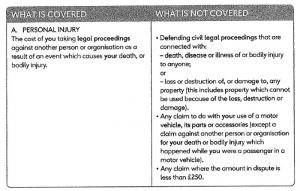It's a myth that there is a Compensation Culture. It's a myth that personal injury claims drive up insurance premiums. But is it possible to show any real public benefit from personal injury compensation claims? Moray Claims / Grigor & Young LLP operates at a fairly local level and, in this article, we will look at 4 examples of ways in which personal injury claims by individuals have resulted – or could result – in changes which are of public benefit. 1. Removing a trip hazard A successful claim for a pedestrian who tripped on a raised piece of tarmac on the pedestrian footway close to the underpass at Alexandra Road, Elgin, resulted in the defect being repaired by Moray Council within a matter of days of the claim being intimated. 2. Properly marking/highlighting a trip hazard This raised area within Elgin bus station caused a pedestrian to trip and fall and suffer injury. It was never entirely clear why the plinth was there in the first place - possibly for an Continue Reading
Can an Adoptive Parent Claim for Nervous Shock as a Secondary Victim?
Here’s a question sent in to us via this website. Regarding your article 'How Nervous Shock Claims depend on whether you are a Primary or Secondary Victim' posted on 9th Dec 2016, I'm curious to know whether the mother of an adopted daughter can be regarded as a secondary victim? That article explained how Nervous Shock is not a medical term but instead one used by lawyers to describe a range of psychiatric conditions that can follow from an accident. Primary victims are people who are injured by being directly involved in the accident circumstances. Secondary victims are people who witnessed what happened to those directly involved in the accident but were not themselves “part of the action”. Claimants in the category of secondary victim suffer psychiatric injury because of fear for the safety of another. In general terms, it’s much easier to succeed with a Nervous Shock claim if you are a primary victim than if you are a secondary victim. For fear that an avalanche of Continue Reading
Moray Claims becomes a trading name of Grigor & Young LLP
In the time since Moray Claims started up - in 2012 - it has been a trading name of Grigor & Young, Solicitors and Estate Agents. During that period, we have been able to help a lot of people in Moray and beyond to claim fair and full compensation for personal injury. In the recent past, we have moved past the 200 mark in terms of number of articles on our blog. Accordingly, there is a lot of information about personal injury claims in Scotland on the website - a resource you can search using the Search Form in the right-hand sidebar of each page (or, if you are using a mobile device, by scrolling further down this page). We have also produced some audio content in starting our Moray Claims podcast. The initial episodes reflect the written content on the site which has proven to be most popular. This is another area of knowledge distribution we hope to continue and expand. From 01 April 2018, Grigor & Young becomes a limited liability partnership. From that date, its Continue Reading
What are your rights following a road traffic accident that was not your fault?
The Competition & Markets Authority (CMA) is a UK government department, responsible for strengthening business competition and preventing and reducing anti-competitive activities. In September 2014, it produced a report following an investigation into the private motor insurance market. One of the things they considered was the possibility of providing improved information to consumers on their rights following an accident. They noted that there appeared to be market-wide support for such a measure. CMA found a poor level of awareness among consumers about their basic rights following a road traffic accident that was not the consumer's fault. The report summarises the legal and factual background to its remit. It explains how the law requires motorists to hold a valid insurance policy to cover “third party” risks. In other words, insure against the risk they will injure another person or their property through their driving and have to pay compensation for those Continue Reading
How do you know if your vehicle is repairable or a write-off after an accident?
If your vehicle is damaged in an accident, how your loss is measured will depend on whether it is regarded as economically repairable or not. In this process, it is the market value of the vehicle at the time of the accident which matters as the economic benchmark. The amount it’s insured for does not matter. Neither does the likely replacement cost. The seriousness of accident damage is ranked by insurance assessors using various categories. Prior to 01 October 2017, the four categories were A to D, with A being most seriously damaged and D least severe. In the name of “progress”, this logical system has now been replaced by something less intuitive. The categories are now A, B, S and N. Categories A and B are unchanged from before. Category A vehicles are so badly damaged that they must be scrapped and crushed. No salvage of parts for re-use is allowed. Under Category B, vehicles are again extensively damaged, though some parts may be salvageable. The vehicle must be Continue Reading
How is your loss calculated if your vehicle is damaged in an accident?
Personal injury claims often result from road traffic accidents. In that context, clearly, potential claims for damage to cars will also come up. In what circumstances will a damaged car be treated as a total loss? In other words, what is the basis of calculation of the claim you can make if your car is damaged? In Scotland, the law dates back to the case of Pomphrey –v- Cuthbertson, decided in 1950. This arose out of a road accident in 1948. William Pomphrey, a newspaper proprietor from Wishaw, and his wife, Joan, made claims for personal injury compensation and losses on Mr Pomphrey’s vehicle against James A. Cuthbertson Limited, agricultural engineers. Mr Pomphrey’s Fordson commercial motor car had been damaged in the collision between the car and a Dodge motor lorry, owned by Cuthbertson and driven by one of their employees. The claim was based on vicarious liability and liability was admitted. The accident had been caused by Cuthbertson’s employee’s negligence. So Continue Reading
3 ways timing is important with Legal Expenses Insurance
I was sad to read that one of my all-time favourite bands, Rush, are "basically done" after 41 years of music making. At times, as a child, I would listen to their LPs incessantly and many of the lyrics have stuck with me through my life. A Farewell to Kings (1977) was the first Rush record I bought and these words are from the title song: When they turn the pages of history When these days have passed long ago Will they read of us with sadness For the seeds that we let grow? We turned our gaze From the castles in the distance Eyes cast down On the path of least resistance Cities full of hatred Fear and lies Withered hearts And cruel, tormented eyes Scheming demons Dressed in kingly guise Beating down the multitude And scoffing at the wise As Rush sang in another song (Circumstances), quoting famous words attributed to Jean-Baptiste Alphonse Karr from the mid-19th century: "The more that things change, the more they stay the same." 40 years on, the last 4 Continue Reading
When does Legal Expenses Insurance cover you for a Personal Injury Claim?
Cammy Keith, the all-time leading goalscorer for Keith football club, went viral on social media following his side's lead to defeat to Rothes on 03 February 2018. Keith (the player) scored both goals for Keith (the team) and so, on results pages, it appeared as though he had almost achieved a near-impossible outcome: a draw where one player was up against a full team of 11 players. A tweet that he had put in the "quite the shift" was retweeted many times. Quite the shift for Keith on his own. pic.twitter.com/nkni1CMcvy — The Harry Wraggs (@THWtwit) February 3, 2018 In that case, the bare statistics gave a misleading impression as to whether it had been a fair match. As an injured person with a possible personal injury claim for compensation, it is never a fair match at the outset. You need to take every possible measure to tip the scales back to your side, even if you don't level them up completely. The scales are weighted in favour of the insurer on the other side Continue Reading
Who are the Best Personal Injury Solicitors in Moray?
At Moray Claims / Grigor & Young, we regularly receive enquiries from people in the Moray area regarding potential personal injury claims. Because – via this website and the Grigor & Young website – we have frequently expressed our thoughts and feelings on all things personal-injury-claim-related, we often get asked who are some of the other Scottish solicitors who provide compensation claims services to injured people in Moray. It’s important that you should be as informed as possible if you are making decisions in relation to a potential personal injury claim. Here is an alphabetical list of some of the solicitors who market their services to people in Moray for personal injury compensation claims. This has been compiled by reference to Google search engine results (“personal injury moray”) and we have tried our best to make the list as comprehensive as possible by researching this over a period of 7 days. 1. Bonnar Accident Law A Scottish-based firm of solicitors Continue Reading
3 types of information your personal injury solicitor needs from you at the start
As Dan Pink notes in his 2018 book, When (The Scientific Secrets of Perfect Timing), by some estimates, about half the people in a typical marathon are taking part in a marathon for the first time. Another thing that links many first-time marathoners, as it turns out, is age. A scientific paper published in 2014 concludes that people search for meaning when they approach a new decade in chronological age. At certain ages, we are inspired to greater self-reflection than at others. Adults often examine their lives for existential meaning when they approach a new decade in age (29, 39, 49 etc.) – which can lead to behaviour that suggests an ongoing search for meaning. Exercising more intensely, with a view to participating in a marathon, is one example of such behaviour. This phenomenon was of interest to me because I completed my first marathon in 2017 – at the age of 49. It seems that reaching the end of a decade in life can shake up our thinking, directing what we do and how we Continue Reading
Why you might be surprised who qualifies as a cohabitee (more people than you’d expect)
In modern society, cohabitation is an increasingly popular family structure. As one aspect of the response to this change, the Family Law (Scotland) Act 2006 was enacted to provide particular limited rights to cohabiting couples. On the breakdown of their relationship within their lifetimes, a former cohabitee has the chance to make a claim for financial provision from his or her former partner. On the death of one of them – provided they did not leave a will – the survivor can make a claim for financial provision from the deceased’s estate. The time limit for a “separation” claim is one year from the date of separation and, for a “death” claim, only 6 months. These time limits are very short indeed and they cannot be extended. As a sort of public information drive, we have a poster we often display outside our offices which summarises the time limit for death claims. If a cohabitee dies as the result of an accident which is due to the fault or breach of duty of Continue Reading
How we help you at Moray Claims
In the video below, Peter Brash of Moray Claims and Grigor & Young explains how we can help you with advice in relation to a possible personal injury claim, especially if you are in Moray. We recommend all injured people to get advice as soon as possible from a local, specialist solicitor. By doing that, you'll be clear about your rights and be in a position to get proper access to justice should you choose to go down the route of making a compensation claim. You need to speak to someone who is not only knowledgeable and experienced, but independent and definitely on your side. The insurers on the other side of your potential claim fit the "well-informed" bit but they're principally looking after the interests of their shareholders and not your interests, despite what they may tell you. In the video, Peter explains why "local is best", in our view. Early advice from a solicitor will set you off on the right track, with the best chance of avoiding all the pitfalls. And Continue Reading











